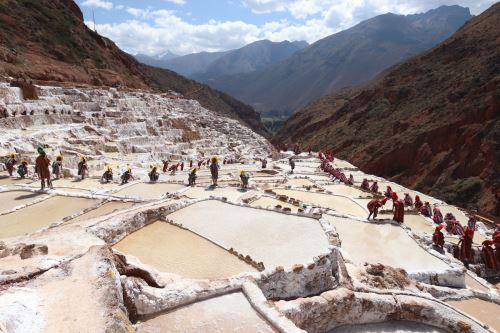In the renowned Salt Pans of Maras, located in Cusco region's Urubamba province, the "Kachi Raymi" or Salt Festival was staged for the first time —a cultural expression aimed at revaluing the ancestral extraction of this mineral for survival.
Over 200 actors, portraying roles such as ancient pre-Inca ruler Toqay Q'apaq, his family, Ayar Kachi (one of the Ayar brothers from the legend of Cusco's foundation), and the Ayllus (communities) entered the salt pools for this unique performance.
Staging director Ronald Huallpa explained that the script was based on chronicles, studies, and archaeological research, which provided it with ancestral, historical, and cultural value for future generations to continue strengthening.
He explained that the Ayllus, currently Pichingoto and Maras Ayllu, entered the salt pans, followed by pre-Inca sovereign Toqay Q'apaq, and then Ayar Kachi, from the Chinanpucyu and Orcconpucyu (springs of saltwater), considered a child of the emerging waters.
Ayar Kachi is the one who teaches inhabitants of this ravine to extract and process salt. Similarly, he organizes and promotes its distribution.
Evidence and remnants of this practice, which continues to this day, have been found in these areas.
During the process of founding the Inca city, Ayar Kachi left Maras for Paccarectambo, in Paruro province, with his three brothers for the expedition and the foundation of the City of Cusco.
In the staging, his death is reported which deeply saddens the residents of the Salt Pans' surrounding areas. However, they do not forget his legacy.
The more than 3,000 people —including tourists and residents— were able to grasp only a part of the history preserved by Maras with its Salt Pans. Many learned that salt has been, since immemorial times, a vital resource for life, alongside water and the Sun.

Maras Sal company Chairman Edwin Pizarro told Andina News Agency that for nearly a decade, they have maintained the idea of "Kachi Raymi." With the progress of studies and discoveries, they now aim to hold it annually during Peru's Independence Day celebrations.